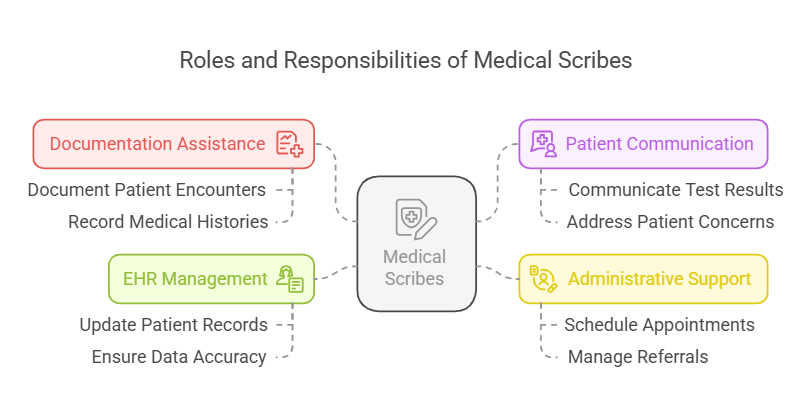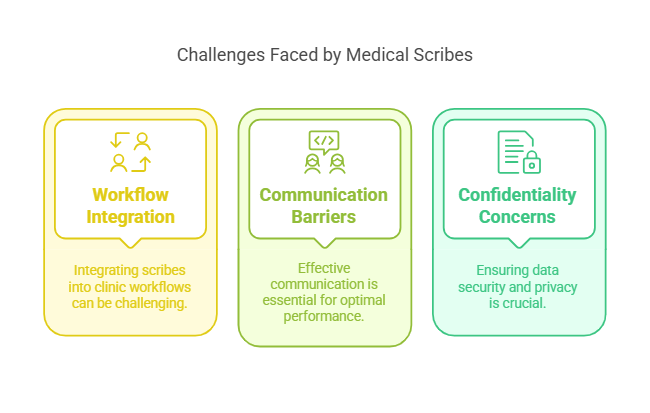How do medical scribes support specialty clinics?
Medical scribes are trained individuals who assist healthcare providers by performing various administrative tasks, allowing physicians to focus more on direct patient care. They are typically responsible for tasks such as documenting patient encounters, managing electronic health records (EHR), and facilitating communication between patients and healthcare providers.
Role of Medical Scribes in Specialty Clinics
Medical scribes in specialty clinics help streamline operations by documenting patient visits in real time. They assist physicians in specialties like cardiology, orthopedics, and dermatology by recording medical histories, treatment plans, and test results. This allows doctors to focus on patient care rather than paperwork. Scribes also improve efficiency by reducing administrative burdens and ensuring accurate documentation. Their role enhances workflow, leading to better patient experiences and optimized clinic performance. By integrating expert medical scribes into your practice, you can boost patient care and streamline operations, allowing physicians to focus on delivering high-quality treatment rather than administrative tasks.
Tasks and Responsibilities
Medical scribes undertake a wide range of tasks in specialty clinics, including but not limited to:
Documentation Assistance: One of the primary responsibilities of medical scribes is to accurately document patient encounters, including medical histories, symptoms, and treatment plans. By efficiently documenting this information, scribes help ensure thorough and accurate medical records.
Patient Communication: Scribes assist in communicating important information to patients, such as test results, treatment options, and medication instructions. They may also answer patient questions and address concerns, thereby enhancing patient satisfaction.
Administrative Support: Medical scribes provide valuable administrative support to physicians, such as scheduling appointments, managing referrals, and completing insurance forms. This allows physicians to focus more on patient care and less on administrative tasks.
EHR Management: Scribes are proficient in navigating electronic health record (EHR) systems and ensuring that patient records are up-to-date and accurate. They play a crucial role in maintaining organized and accessible patient information.
Improving Efficiency and Productivity
By assisting physicians with documentation and administrative tasks, medical scribes contribute to significant improvements in efficiency and productivity within specialty clinics. With scribes handling documentation duties, physicians can see more patients in a day and spend more time providing direct patient care.
Quality of Patient Care
The presence of medical scribes in specialty clinics contributes to the overall quality of patient care in several ways:
Ensuring Accurate Documentation: By accurately documenting patient encounters in real-time, scribes help ensure that medical records are comprehensive and up-to-date. This is essential for providing continuity of care and coordinating treatment plans.
Facilitating Smooth Patient Flow: Medical scribes help streamline clinic operations by assisting with patient intake, documentation, and discharge procedures. This results in improved patient flow and reduced wait times, leading to a better overall patient experience.
Assisting with Follow-up Procedures: Scribes play a crucial role in facilitating follow-up procedures, such as scheduling additional tests or appointments. This ensures that patients receive timely and appropriate care following their clinic visit.
Training and Qualifications
Becoming a medical scribe typically requires a combination of education and on-the-job training. While specific requirements may vary, most employers prefer candidates with a background in healthcare or medical terminology. Additionally, scribes undergo training to familiarize themselves with clinic workflows, documentation practices, and EHR systems.
Challenges Faced
Despite their numerous benefits, medical scribes may encounter certain challenges in specialty clinic settings:
Integration into Existing Workflows: Integrating scribes into existing clinic workflows can be challenging, particularly during the initial implementation phase. Clinic staff may need time to adjust to the presence of scribes and establish efficient communication channels.
Communication Barriers: Effective communication between scribes, physicians, and other clinic staff is essential for optimal performance. Language barriers or differences in communication styles can hinder collaboration and productivity.
Ensuring Confidentiality: Medical scribes handle sensitive patient information on a daily basis, making confidentiality and data security paramount. It is essential for clinics to implement strict privacy protocols and ensure that scribes adhere to HIPAA regulations.
Technological Advancements
Advancements in technology have transformed the role of medical scribes, enabling them to work more efficiently and effectively:
Utilization of AI and Automation: Some specialty clinics are leveraging artificial intelligence (AI) and automation technologies to enhance the capabilities of medical scribes. These tools can automate repetitive tasks, such as data entry, allowing scribes to focus on more complex activities.
Electronic Health Record (EHR) Systems: The widespread adoption of electronic health record (EHR) systems has streamlined documentation processes and improved access to patient information. Medical scribes are proficient in navigating EHR systems and leveraging their full potential to support clinic operations.
Cost-effectiveness
While implementing a medical scribe program may require an initial investment, the long-term benefits often outweigh the costs:
Financial Implications for Clinics: Specialty clinics that employ medical scribes may experience cost savings in several areas, including increased physician productivity, reduced transcription expenses, and improved billing accuracy.
Long-term Benefits Outweighing Initial Investment: Despite the upfront costs associated with hiring and training medical scribes, the long-term benefits, such as improved efficiency, productivity, and patient satisfaction, can lead to significant returns on investment for specialty clinics.
Patient Satisfaction and Experience
The presence of medical scribes in specialty clinics can have a positive impact on patient satisfaction and experience:
Personalized Interactions: Scribes often interact closely with patients, assisting with documentation, answering questions, and providing support throughout the clinic visit. This personalized approach enhances the overall patient experience and fosters trust and rapport.
Reduced Wait Times: By streamlining clinic operations and assisting with administrative tasks, medical scribes help reduce wait times for patients, allowing them to receive timely and efficient care.
Future Trends and Predictions
Looking ahead, several trends and predictions are shaping the future of medical scribing in specialty clinics:
Expansion into Various Medical Specialties: The demand for medical scribes is expected to grow across a wide range of medical specialties, including but not limited to cardiology, orthopedics, and oncology. As specialty clinics continue to evolve, the need for scribe support is likely to increase.
Integration of Virtual Scribes: With the rise of telemedicine and virtual healthcare services, the integration of virtual scribes is becoming increasingly prevalent. Virtual scribes can assist physicians remotely, further expanding access to scribe support.
Case Studies and Success Stories
Numerous case studies and success stories highlight the tangible benefits of medical scribes in specialty clinics:
Real-life Examples of Clinics Benefiting from Medical Scribes: From improved efficiency and productivity to enhanced patient satisfaction and quality of care, specialty clinics across the country are experiencing firsthand the positive impact of medical scribe programs.
Regulatory Compliance
Compliance with regulatory standards, such as HIPAA regulations, is paramount for specialty clinics employing medical scribes:
HIPAA Regulations: Medical scribes must adhere to strict privacy and confidentiality protocols to ensure the protection of patient information. This includes maintaining secure electronic health records (EHR) and safeguarding patient data from unauthorized access.
Feedback from Physicians and Staff
Physicians and staff members who work closely with medical scribes often provide valuable feedback on their experiences:
Perspectives on the Effectiveness of Scribes: Many physicians and clinic staff members report significant improvements in workflow efficiency, documentation accuracy, and overall clinic operations with the addition of medical scribes. Their contributions are widely recognized and appreciated within specialty clinic settings.
Less Known Facts About Medical Scribes in Specialty Clinics
AI-Assisted Scribing is on the Rise
Artificial intelligence (AI) is increasingly being integrated with medical scribing to improve documentation efficiency. AI-powered scribing tools can assist human scribes by automating repetitive tasks, reducing errors, and enhancing workflow. Read more about AI-assisted scribing in healthcare.
Medical Scribes Can Specialize in Niche Areas
Beyond general medical documentation, scribes can specialize in fields like radiology, oncology, and neurology. Specialized scribes have a deep understanding of terminology and procedures specific to these fields, improving the accuracy of patient records. Learn how medical scribes contribute to specialized fields.
Scribes Help Reduce Malpractice Risks
Accurate documentation by medical scribes can help mitigate legal risks for physicians by ensuring that medical records are complete and precise. This reduces the likelihood of malpractice claims due to miscommunication or incomplete records. Explore the impact of scribes on malpractice reduction.
Virtual Scribing Services Are Expanding in 2025
With advancements in telemedicine, virtual scribes are becoming more prevalent. They assist physicians remotely by transcribing patient encounters in real-time, further streamlining healthcare documentation. Read about the growth of virtual scribing services.
Bilingual Scribes Are in High Demand
Specialty clinics serving diverse patient populations increasingly seek bilingual scribes who can help bridge language barriers between doctors and patients, ensuring clearer communication and improved patient care. See why bilingual medical scribes are essential in modern healthcare.
Medical Scribing is a Pathway to Healthcare Careers
Many aspiring healthcare professionals start as medical scribes to gain firsthand experience before pursuing careers in medicine, nursing, or physician assistant roles. This role provides valuable exposure to clinical workflows and medical decision-making.
Conclusion
In conclusion, medical scribes play a vital role in supporting specialty clinics by assisting physicians with documentation, administrative tasks, and patient communication. ACMSO enhances this support by ensuring high-quality scribe services that improve efficiency, productivity, and the overall quality of patient care. As technology continues to advance and healthcare delivery models evolve, the demand for medical scribe support in specialty clinics is expected to grow exponentially.
FAQs About Medical Scribes in Specialty Clinics
-
Hiring a medical scribe helps reduce physician burnout, improves documentation accuracy, and increases patient interaction time. It also enhances workflow efficiency, allowing clinics to handle more patients without compromising care quality.
-
Medical scribes receive HIPAA training and follow strict privacy protocols. They do not discuss patient information outside of work settings and use secure EHR systems to maintain confidentiality.
-
Yes, medical scribes often replace traditional transcription services by providing real-time documentation. This eliminates delays in record updates and improves physician workflow.
-
In-person scribes work directly in the clinic alongside physicians, while virtual scribes assist remotely via a secure digital connection. Both improve efficiency, but virtual scribes provide greater flexibility.
-
By handling documentation tasks, medical scribes allow physicians to focus on patient care. This leads to more personalized interactions, shorter wait times, and a more efficient clinic experience.






